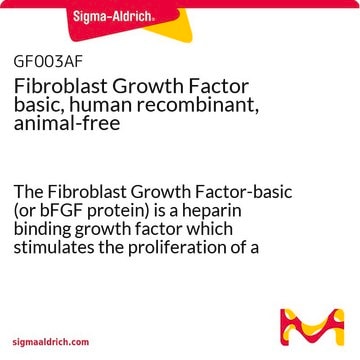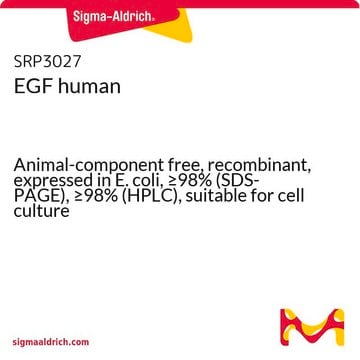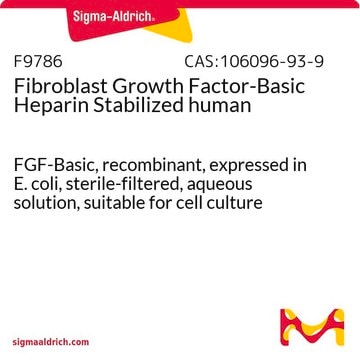GF446
Thermostable bFGF,Human
HumanKine®, recombinant, Xeno-free, >95% (SDS-PAGE), suitable for cell culture
Synonyme(s) :
FGF2, prostatropin, Prostatropin, HBGF-2, BFGF
About This Item
Produits recommandés
product name
HumanKine® Thermostable bFGF,
Human Recombinant, Engineered bFGF growth factor with enchanced thermostability compared to the wild-type bFGF protein. Allows a less vigorous feeding schedule for human es/ips and neural stem cell culture.
Niveau de qualité
Pureté
>95% (SDS-PAGE)
Fabricant/nom de marque
HumanKine®
Impuretés
<0.5 μg/mg protein endotoxin (<5 EU/μg)
Numéro d'accès UniProt
Description générale
Fibroblast Growth Factor-basic (bFGF) is a heparin binding growth factor which stimulates the proliferation of a wide variety of cells including mesenchymal, neuroectodermal and endothelial cells. bFGF also exerts a potent angiogenic activity in vivo. Human bFGF is a 17.2 kDa protein containing 154 amino acid residues. bFGF synergizes with the BMP antagonist noggin to sustain undifferentiated proliferation of human embryonic stem (hES) cells under feeder-free conditions.
Application
Stem Cell Research
Growth Factors & Receptors
Qualité
Forme physique
Stockage et stabilité
Informations légales
Clause de non-responsabilité
Code de la classe de stockage
13 - Non Combustible Solids
Classe de danger pour l'eau (WGK)
WGK 3
Point d'éclair (°F)
Not applicable
Point d'éclair (°C)
Not applicable
Certificats d'analyse (COA)
Recherchez un Certificats d'analyse (COA) en saisissant le numéro de lot du produit. Les numéros de lot figurent sur l'étiquette du produit après les mots "Lot" ou "Batch".
Déjà en possession de ce produit ?
Retrouvez la documentation relative aux produits que vous avez récemment achetés dans la Bibliothèque de documents.
Les clients ont également consulté
Articles
Fibroblast growth factors (FGFs) regulate developmental pathways and mesoderm/ectoderm patterning in early embryonic development.
Fibroblast growth factors (FGFs) regulate developmental pathways and mesoderm/ectoderm patterning in early embryonic development.
Fibroblast growth factors (FGFs) regulate developmental pathways and mesoderm/ectoderm patterning in early embryonic development.
Fibroblast growth factors (FGFs) regulate developmental pathways and mesoderm/ectoderm patterning in early embryonic development.
Notre équipe de scientifiques dispose d'une expérience dans tous les secteurs de la recherche, notamment en sciences de la vie, science des matériaux, synthèse chimique, chromatographie, analyse et dans de nombreux autres domaines..
Contacter notre Service technique










